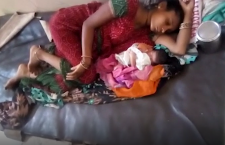When the going gets tough, the tough get hairy.
There are scenes you see on a regular midsummer day in Bundelkhand that turn the most common business ideas into those tinged with pathos and absurdity.
Like the picture of a market square where a weighing scale balances a fluffy head of hair against a half kg. weight.
Hair that has been painstakingly collected by women as they comb their tresses each day, and then handed over to Sunil of Supa village, who comes a-calling to their village on his cycle. He barters the hair for small necessary goods – utensils, stationary and snacks for the kids. He’s been doing this for six years now, and it’s as comfortable a livelihood as any in factory-less, drought-prone Mahoba.
This ‘waste’ hair is resold for the princely sum of 2,000 rupees per kg.
According to a recent ILO report (2017), while Uttar Pradesh has shown slight improvement in its poor development indicators, it still depicts patterns of low and irregular income in the ever-increasing casual labour market (chiefly construction), and skewed and poor record of other forms of employment. The distress in the agricultural marketplace, and climate concerns notwithstanding, policies to bulwark especially marginalized populations from poverty have been inadequate, leaving unemployment as the main – visible and invisible – cause for UP’s stagnation in the race towards development and progress.
A concern that can be traced back to Bundelkhand’s secondary school educational quality, which doesn’t make for high retention levels or highly motivated graduates, despite the low dropout rates recorded by the latest census – a mere 9.4%. A socio-economic phenomenon we sense in Sunil, who sports a shiny baldpate as he sorts through the hair, and boasts of the commonly held ‘high-school-fail’ qualification he holds, ‘Meaning, I chose not to continue in school when I reached high school. This must have been in 1995. In 1998 I left for Kanpur. My son was a year old at the time. I used to sort out waste. This work, plus some manual labour on the side, is what got my kids through school.’
For better or for worse, Sunil’s children too have followed his footsteps, on the familiar path of creative struggle. His son Raghuvir, who shares his father’s philosophical detachment, but looks quite different, with that striking head of spiky red hair says, without a hint of resentment, ‘I applied for jobs and never got a call back from any. So what else is left but this work?’ Raghubir now takes his cycle around his father’s beat, the similar jingle of bangles, balloons, kitchen essentials calling out the villagers to come out and bring their wasted locks.
Consequently, Gulab Rani, a resident of Sunil’s own Supa village chuckles when we ask how much hair she has stowed away for a rainy day. ‘A lot, is all I will say. Why? Because it sells fast and high.’
And that’s not something you can say about much in Bundelkhand’s markets these days, and so when there’s a golden egg, you keep it safe. Howsoever hairy it may be.
This article was first published on Firstpost

